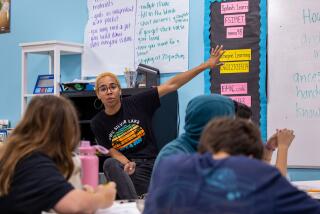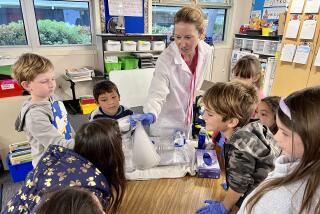Not Too Late to Keep Young Flames Burning
- Share via
Bruce M. Alberts says he could walk into any classroom of beginning students anywhere in the world and see the same thing. A roomful of scientists.
“All young children are excited about all kinds of things that I would call science,” says Alberts, president of the National Academy of Sciences. “They are trying to understand the world, trying to fool with things and see how they work, trying to get explanations for everything.”
But somewhere along the way, something goes terribly wrong.
“People come to school with this natural desire to understand, and we beat it out of them somehow,” says Alberts, a distinguished cell biologist who taught at the University of California in San Francisco for two decades.
We have turned people off on science, he says, because science education has all too often become a boring process of memorization that buries a child’s natural desire to understand how things work. It begins in elementary school, he says, and continues all the way through college.
“College courses are among the most boring of all,” he says.
It can be turned around, he says, if most of the textbooks are thrown away, if the current fixation on computers can be beaten back, if teachers get a little more help from working scientists, and if educators can be made to understand that good science is an investigative process.
The study of science can be one of the most exciting adventures in life, Alberts says, and if it is taught properly, a child’s natural instincts to learn could be nurtured rather than deadened.
At stake here, he says, is something far more important than science itself. Science can keep the spark of human inquiry alive, reinvigorating the entire education system.
“I could see engagement through science and science education as a way of energizing people to appreciate knowledge and get excited about the world,” he says. That would strengthen the desire to learn about all things, not just science, he adds.
The first step in that direction is to help people understand what science is--and what it is not.
“Science should be defined not as words, not the parts of a flower, the parts of a whale, but science is sort of an investigatory process and it should be part of everybody’s world,” Alberts says. “I know for a fact, from my experiences in schools, that when you do that, kids get really engaged in school itself. You can use that kind of involvement in hands-on science to get kids who normally wouldn’t be interested in school excited about learning in general.”
Although Alberts is the author of the leading textbook on cell biology, he insists that one of the chief problems lies in the quality of most textbooks. When his own daughter returned home from school one day, he picked up her biology textbook and was appalled. Although it was the leading textbook of the day, it wasn’t about biology at all, he says. It was a list of words to be memorized. It was boring.
That statement would not have surprised the late Nobel Laureate Richard Feynman. Years ago the Caltech physicist agreed to serve on the California commission that picks textbooks for our schools.
But Feynman, always the rebel, decided to do something extraordinary. He read the books.
“The books were lousy,” Feynman wrote later.
But he said that what troubled him more than the quality of the books was the obvious fact that none of the other commissioners had even read them. Yet they approved a set of books that Feynman could only describe as “false.”
Better textbooks would be a giant step in the right direction, Alberts says, but it would not solve the problem of science education. In an age when computers and high-tech gadgets are seen as the key to getting kids more interested in learning, Alberts is emphasizing a low-tech approach.
What is needed is more commitment by scientists to science education, beginning at the elementary school level and going all the way through college. Scientists, he says, need to get directly involved in their local schools, not necessarily as teachers but as advisors and counselors.
But most important of all, science needs to be taught as a process, not a collection of facts. It is inquiry, not memorization.
Alberts cites the pioneering work of Caltech’s James M. Bower and Jerry Pine, who have worked with Pasadena school officials to create basic science courses that emphasize experimentation through hands-on involvement. The program, which includes science kits that help teachers get their students involved in doing science, is being expanded to many other school districts throughout California.
It may sound like a small start, but Alberts believes such programs could help keep alive the natural flame that burns in young minds--the desire to learn, to understand.
If you are worried about keeping kids in school and off the streets, give them something to think about.
Lee Dye can be reached via e-mail at 72040.3515@compuserve.com.






